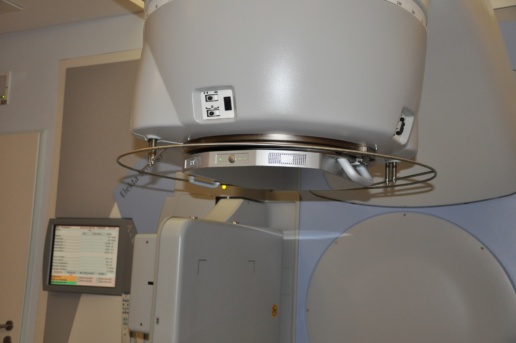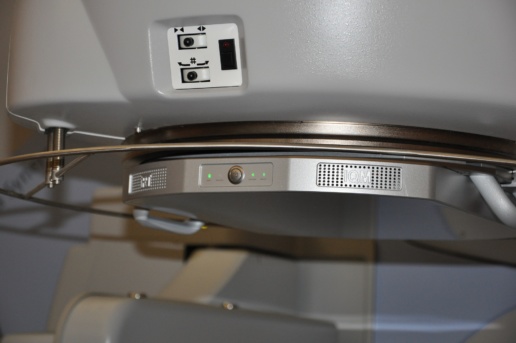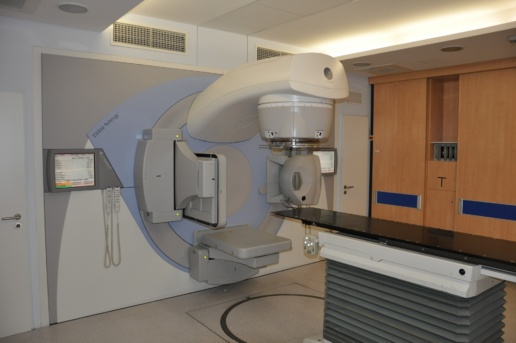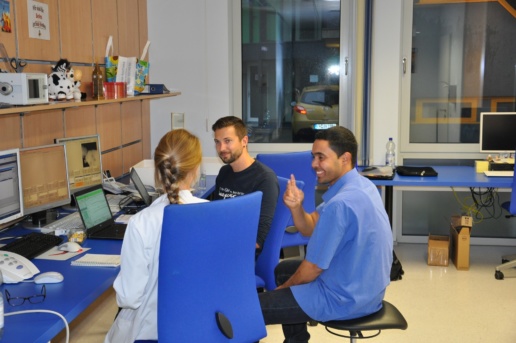Lake Constance Radiation Oncology Center, Singen / Friedrichshafen
The Lake Constance Radiation Oncology Center in Singen-Friedrichshafen is a certified radio-oncological center as well as an Elekta European Reference Site.
At its two locations, in Singen and Friedrichshafen, the private clinic offers perfectly matched state-of-the-art therapy devices. All cancer treatments utilize highly complex volumetric modulated arc therapy.
In September 2015, the pre-clinical IQM prototype was installed at the clinic in Friedrichshafen. The installation, configuration and training was done in the late afternoons/evenings with Marlies Pasler, medical physicist, during routine clinical operation. The training was concluded by monitoring three different VMAT cases that were created for clinical application during the installation. Holger Wirtz, Head of the Medical Physics Group stated “IQM will allow us to further optimize the efficiency of our treatment workflow, especially our verification processes.” The clinic plans to implement Online Adaptive Radiotherapy in the coming months. “We think that the fully automated real-time verification approach of the IQM system helps us implementing Online Adaptive Radiotherapy in our clinical routine and to follow the EU-directive 2013/59” stated Holger Wirtz.
AddressRöntgenstraße 12CityD-88048 Friedrichshafen, GermanyMain ContactDr. Marlies PaslerEmailinfo@i-rt.de for detailsPhoneinfo@i-rt.de for detailsWebpagewww.strahlentherapie-singen.deLinac3 (Elekta)TPSPhilips PinnacleInstall. Date2015-09-17IQM tested onElekta Synergy (MLCi2 Collimator)IQM related publications Download the full presentation about the first year of clinical experience with the IQM System for Fraction QA at the Lake Constance Radiation Oncology Center in Singen / Friedrichshafen. This presentation was given by Marlies Pasler, PhD at the ASTRO 2019 Annual Meeting in Chicago, IL. This multi-center study by Livia Marazzo, published in the German Journal of Radiation Therapy and Oncology tests the sensitivity of the Integral Quality Monitor (IQM) transmission detector for online dose monitoring of IMRT treatment techniques to detect small delivery errors. The article furthermore investigated the correlation between changes in the IQM signal, induced by small delivery errors, with other metrics like Gamma passing rate and dose-volume histogram metrics. Download this article to learn about the high sensitivity of the IQM transmission detector for small delivery errors as well as the good correlation between the IQM detector signal and DVH metrics. This article discusses the influence of the Integral Quality Monitor (IQM) transmission detector on photon beam properties. The authors evaluated data acquired at nine different Radiation Therapy centers and concluded that the magnitudes of changes observed justify treating IQM either as energy-specific tray factors in the treatment planning system or alternatively as a set of modified output factors for each linac energy. Download this article for some valuable guidance for implementing the IQM System into your clinical routine. Kilian Michel and his colleagues at the Lake Constance Radiation Oncology Center in Friedrichshafen, Germany evaluated the IQM System for Online Dosimetry during the patient treatment. The y checked the long-term signal stability, the error detection sensitivity for induced errors, the correlation of the IQM and the Dose-Volume-Histogram as well as treatment plan verification with the IQM System. Marlies Pasler and her colleagues at the Lake Constance Radiation Oncology Center in Friedrichshafen, Germany investigated the potential of the IQM System to catch errors before they become clinically relevant. They also examined whether IQM would help them to improve the efficiency of their processes and finally they assessed whether IQM could successfully replace their current pre-treatment QA. They concluded that IQM could improve the efficiency of their workflow and that its error detection capabilities are sufficient for clinical practice. Download the full presentation that was shown during the ESTRO35 Conference in Turin, Italy in May 2016.
One year of clinical experience with IQM at Lake Constance Radiation Oncology Center in Singen / Friedrichshafen
Real-time beam monitoring for error detection in IMRT plans and impact on dose-volume histograms
Influence of the Integral Quality Monitor transmission detector on high energy photon beams: A multi-centre study
Online dosimetry with the Integral Quality Monitor
Pre-clinical tests of the IQM System
An intriguing device...
John Wong, Ph.D. Head of Radiation Oncology Physics, Johns Hopkins University, Baltimore, USA
"This allows everyone to stay ahead of the game of QA."
Stanley Benedict, Ph.D. Professor & Vice Chair of Clinical Physics, Department of Radiation Oncology, University of California at Davis Comprehensive Cancer Center, USA
"IQM constitutes a paradigm shift in treatment verification..."
David Jaffray, Ph.D. Head of Radiation Physics Department, Princess Margaret Cancer Centre, Toronto, Canada
"The best idea I have seen in years..."
Uwe Götz, Medical Physicist, St. Vincenz Krankenhaus, Limburg, Germany
"A physics tool for the independent verification of the final beam product."
Robert Heaton, Ph.D. Medical Physicist, University of Toronto, Canada
"Measuring with IQM is a piece of cake..."
Lan Lin Ph.D. Medical Physicist, Johns Hopkins Group, Washington, D.C., USA
"I see endless possibilities..."
Henk Huizenga, Ph.D. Head of Radiation Oncology Physics, Radboud University Nijmegen, The Netherlands
"The IQM System is a highly sensitive dose monitoring device.”
Stefania Pallotta, Department of Experimental and Clinical Biomedical Sciences “Mario Serio”, University of Florence, Florence, Italy
"IQM is an especially good candidate for monitoring small fields due to its unique detector design"
David Hoffman, Ph.D., Medical Physicist, University of California San Diego, USA
"Why didn't anybody think of this before?"
A sentence that we hear during almost every presentation.
"Our study demonstrates clinically negligible changesin beam quality and surface dose for all investigated beams.”
Bozidar Casar, Ph.D., Medical Physicist, Institute of Oncology Ljubljana, Slovenia
"The results of our study demonstrate the clear and consistent correlation of the IQM signal with DVH metrics.”
Livia Marrazzo, Medical Physic Unit, Careggi University Hospital, Florence, Italy
"IQM is a key component of our automated treatment quality control and allows us to fully comply with the requirements defined in the 2013/59/EURATOM directive."
Holger Wirtz, Lake Constance Radiation Oncology Center, Singen-Friedrichshafen, Germany
"The quick setup and fully automated handling of all clinical data significantly reduces the time we need for Plan QA. Our clinical evaluation has shown that the error detection capability of the IQM System is at least as good, and in many cases even better, than with conventional 3D phantoms."
Otto Sauer, Ph.D., Head of Medical Physics, University of Würzburg, Würzburg, Germany




